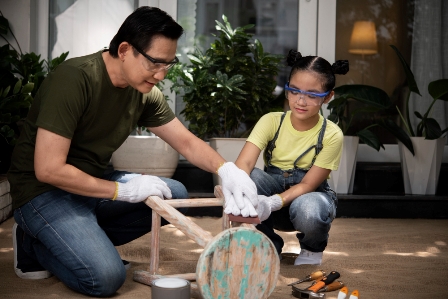In the hustle and bustle of modern life, the state of our living spaces often takes a back seat. However, the connection between cleanliness and well-being is profound. A tidy environment is not just visually pleasing; it can significantly impact our physical and mental health. Let’s delve into the psychology of clean and explore how tidying up can positively affect your overall well-being.
The Physical Impact of Cleanliness
Maintaining a clean space goes beyond aesthetics; it directly influences our physical health. A clean environment reduces the risk of allergies and infections. Dust-free surfaces and well-ventilated spaces contribute to a healthier respiratory system. As we navigate our daily lives, the cleanliness of our surroundings plays a crucial role in preventing illnesses.
The Psychological Benefits
Beyond the physical, the psychological benefits of cleanliness are noteworthy. A clutter-free space reduces stress and promotes mental clarity. Studies have shown that individuals in organized environments demonstrate improved focus and cognitive function. The act of tidying up becomes a form of mindfulness, positively impacting mental health.
Organization and Productivity
The state of our surroundings can significantly impact our productivity. An organized workspace enhances efficiency and fosters a conducive environment for work. The simple act of decluttering can lead to better decision-making and increased productivity. Tidying up becomes a catalyst for a more focused and productive work routine.
Social Implications
Our living spaces are not isolated; they influence our social interactions. A clean and inviting home is more likely to be a welcoming space for friends and family. Moreover, the psychological impact of a clutter-free environment extends to social relationships, creating a positive atmosphere for connections to flourish.
The Connection Between Cleanliness and Sleep
A tidy bedroom can contribute to better sleep quality. The psychological reasons behind this connection lie in the sense of order and calmness associated with a clean space. When our immediate environment is organized, our minds find it easier to unwind, promoting a restful night’s sleep.
Cultural Perspectives on Cleanliness
Cleanliness is not a universal concept; it varies across cultures. Understanding different cultural perspectives on cleanliness provides insights into the diverse ways people approach tidiness. From daily rituals to the significance of cleanliness in various societies, cultural nuances shape our understanding of a clean environment.
Challenges in Maintaining Cleanliness
While the benefits of cleanliness are evident, many individuals face challenges in maintaining a clean space. Identifying and addressing common obstacles, such as lack of time or motivation, is crucial. Practical tips and strategies can empower individuals to overcome these challenges and cultivate a cleaner lifestyle.
Environmental Impact of Clean Practices
The impact of cleanliness extends beyond personal well-being to the environment. Adopting eco-friendly cleaning practices contributes to a healthier planet. From sustainable cleaning products to mindful consumption, individuals can play a role in minimizing their environmental footprint through clean habits.
The Role of Routine in Cleanliness
Consistency is key when it comes to cleanliness. Establishing regular cleaning routines transforms tidying up from a sporadic activity to a habitual practice. The discipline of maintaining cleanliness becomes ingrained in daily life, positively influencing overall well-being.
Cleanliness and Emotional Resilience
A clean environment can contribute to emotional resilience. Tidying up becomes a coping mechanism, providing a sense of control during challenging times. The orderliness of our surroundings can influence our emotional responses, fostering a resilient mindset in the face of stress.
The Influence of Technology on Tidying Habits
In the digital age, technology plays a role in shaping our habits, including cleanliness. Various apps and tools aid in organizing and decluttering spaces. From virtual to-do lists to smart home devices, technology offers solutions for modern individuals striving to maintain a clean and organized lifestyle.
Cognitive Benefits of Decluttering
Decluttering is more than just rearranging physical objects; it positively impacts cognitive function. Studies suggest that a decluttered space reduces cognitive load, allowing the brain to focus on essential tasks. This cognitive clarity contributes to improved decision-making and problem-solving.
The Impact on Personal Development
The state of our living spaces reflects our mindset and discipline. A clean and organized environment is often seen as a reflection of a disciplined mind. Cultivating cleanliness becomes a journey of personal development, influencing not only the external surroundings but also internal growth.
FAQs
Cleaning routines vary, but a weekly schedule is generally recommended for maintaining a clean and healthy environment.
Yes, different cultures have unique perspectives on cleanliness, influencing daily rituals and societal norms.
Technology offers various tools, from organizational apps to smart devices, that can assist in maintaining a clean and tidy space.
Eco-friendly cleaning practices include using natural cleaning agents, reducing waste, and choosing sustainable cleaning products.
A clean and organized bedroom promotes a sense of calmness and order, positively impacting sleep quality.
Conclusion
The psychology of clean is intricate and far-reaching. From mental and physical health benefits to its impact on relationships and sleep quality, maintaining cleanliness is a holistic approach to well-being.









Find Us on Socials